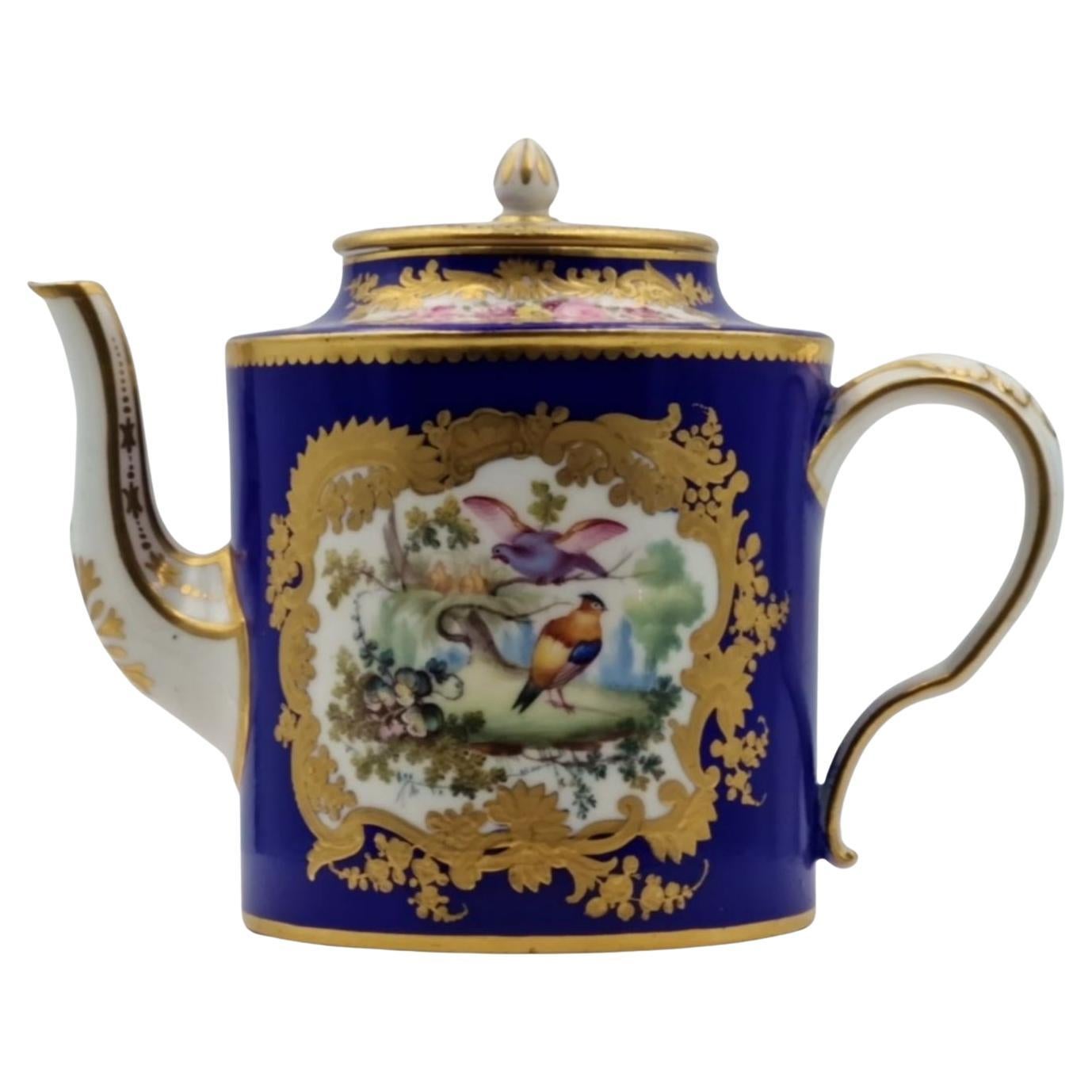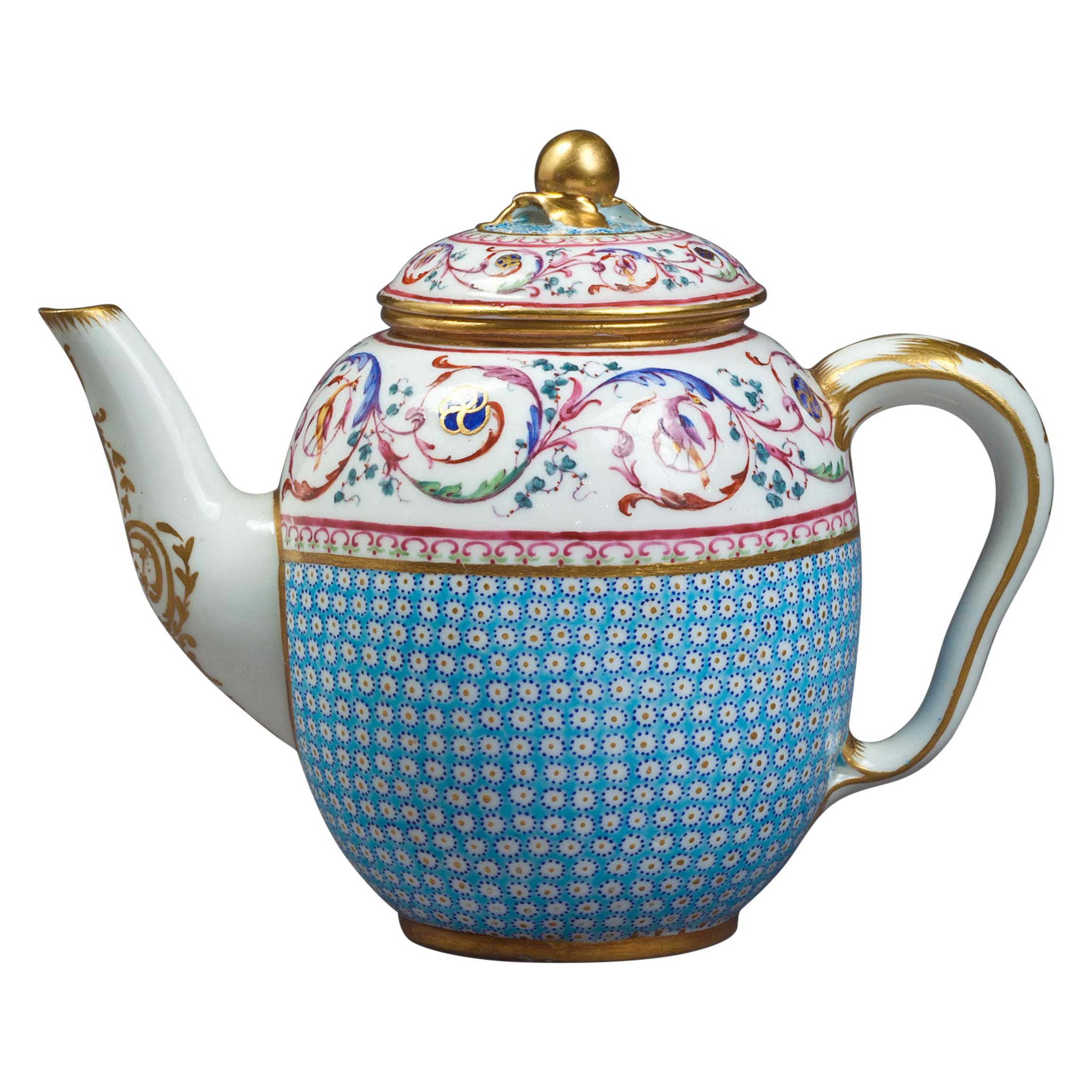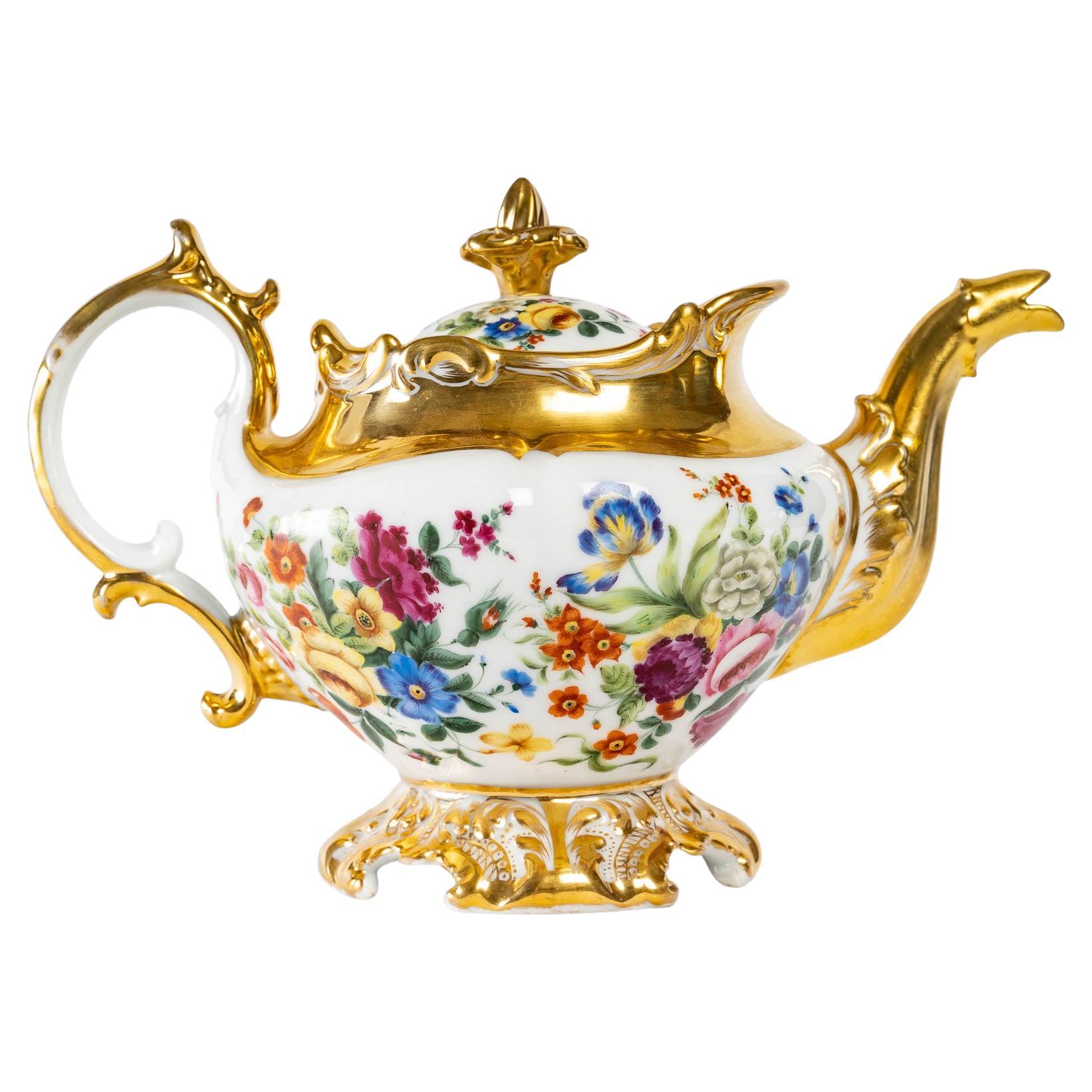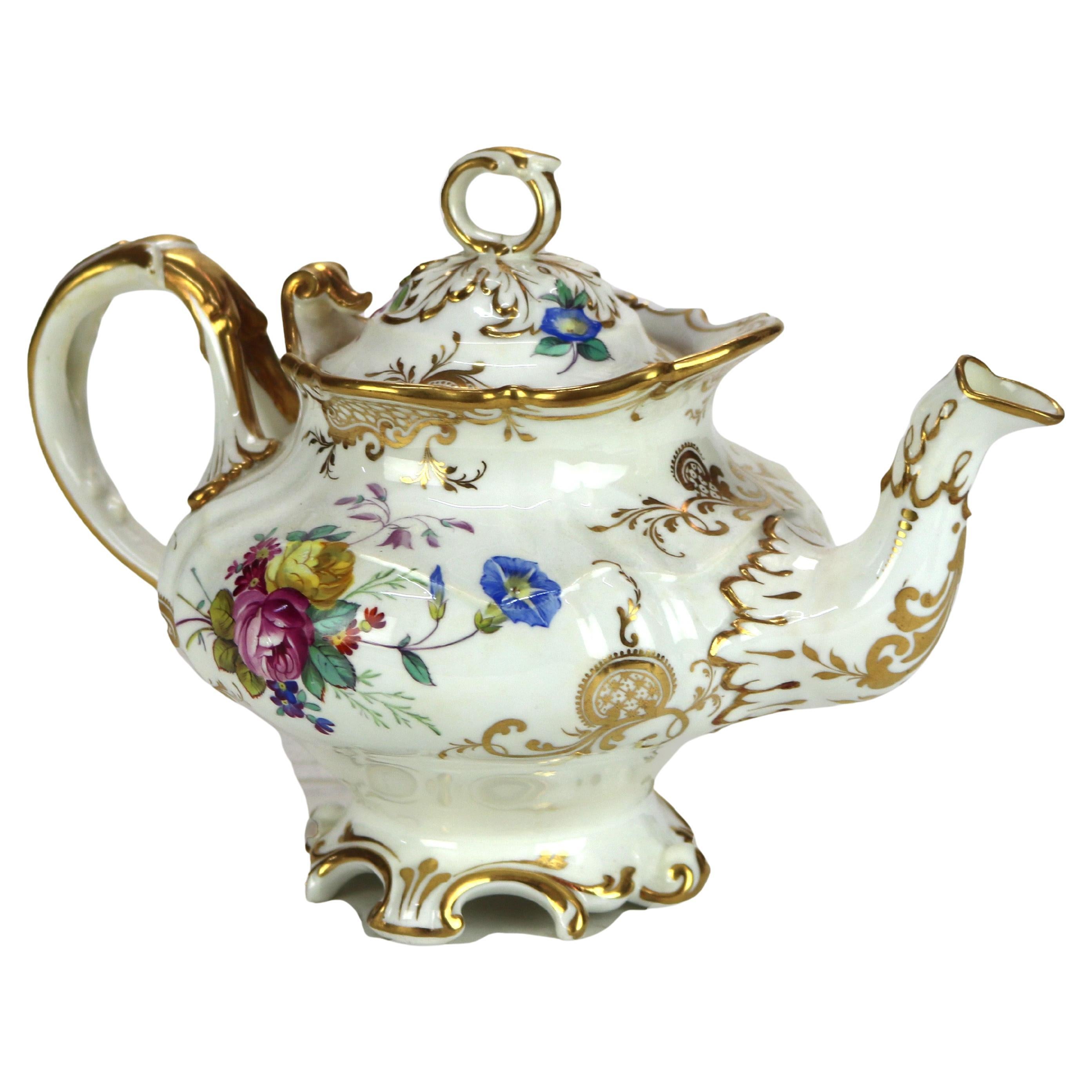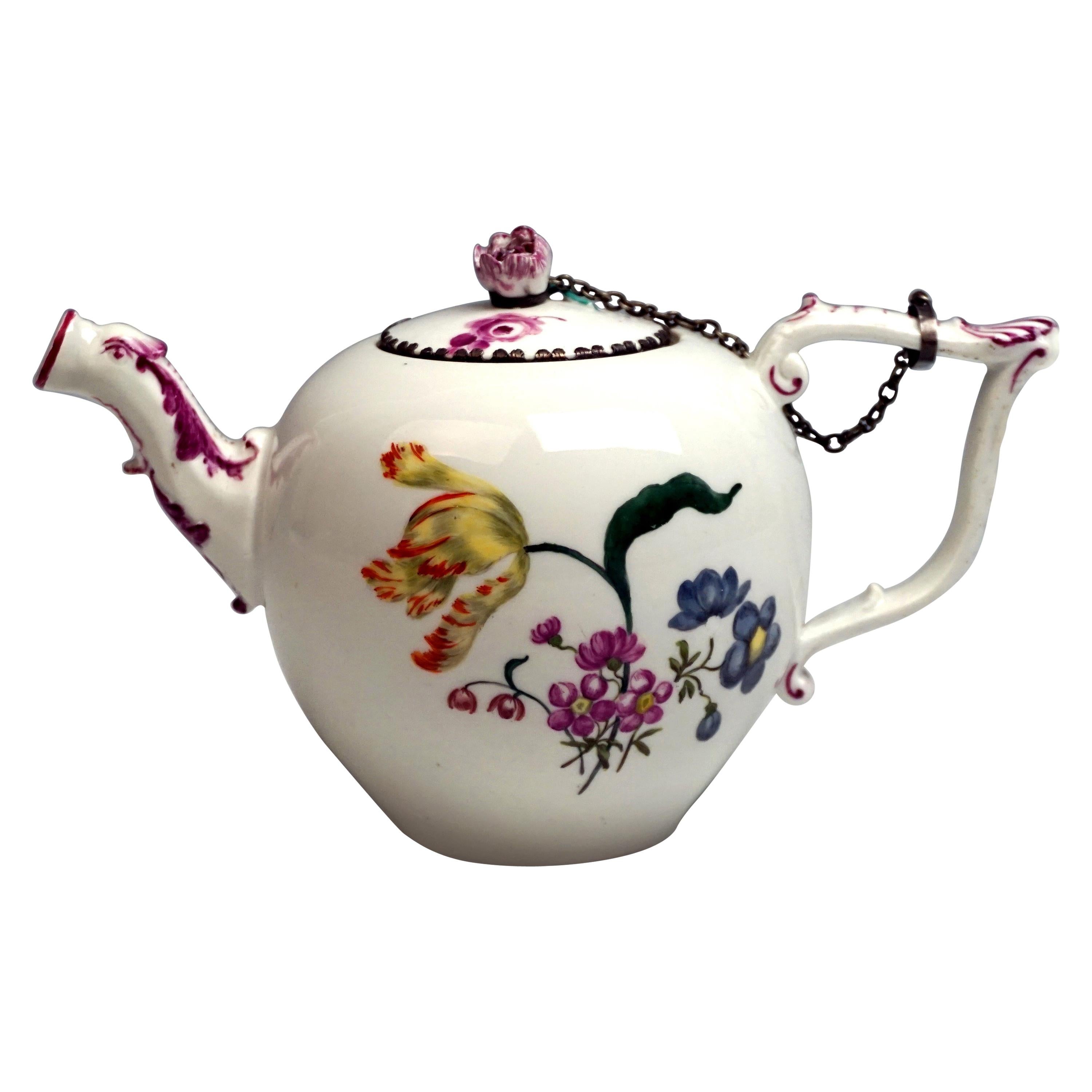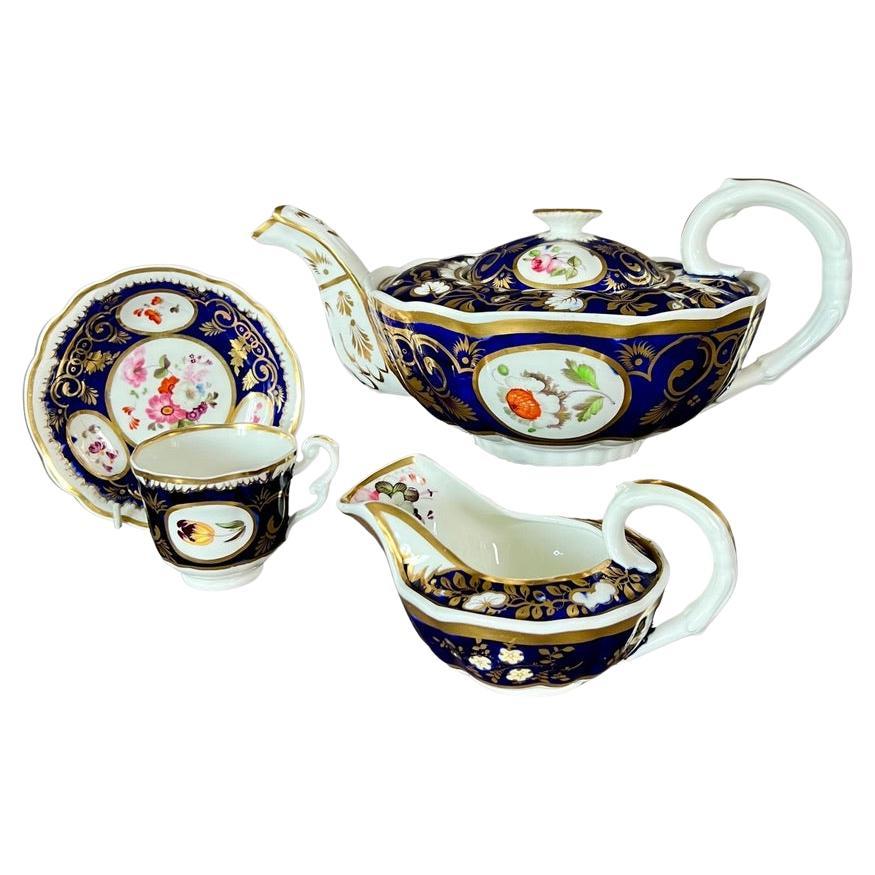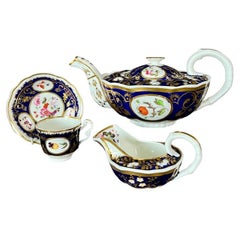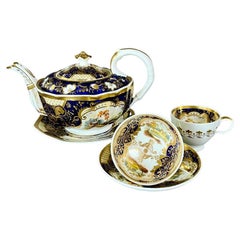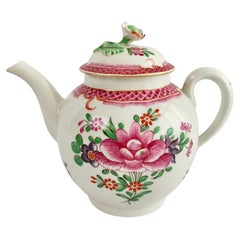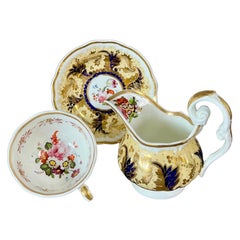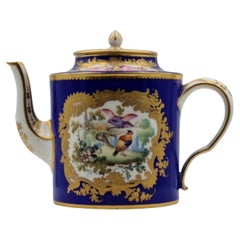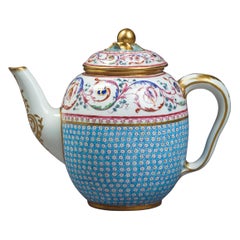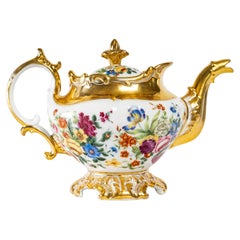Items Similar to Samuel Alcock Porcelain Teapot, Blue, Gilt and Flowers, Rococo Revival ca 1837
Want more images or videos?
Request additional images or videos from the seller
1 of 15
Samuel Alcock Porcelain Teapot, Blue, Gilt and Flowers, Rococo Revival ca 1837
$600
$75020% Off
£453.53
£566.9120% Off
€521.18
€651.4820% Off
CA$835.50
CA$1,044.3720% Off
A$929.46
A$1,161.8220% Off
CHF 487.23
CHF 609.0420% Off
MX$11,357.72
MX$14,197.1520% Off
NOK 6,204.29
NOK 7,755.3720% Off
SEK 5,840.48
SEK 7,300.6120% Off
DKK 3,890.42
DKK 4,863.0320% Off
Shipping
Retrieving quote...The 1stDibs Promise:
Authenticity Guarantee,
Money-Back Guarantee,
24-Hour Cancellation
About the Item
A teapot with cover in the “rustic bean” shape, cobalt blue ground with gilt acanthus motif and finely painted flower posies on the belly of the teapot
Pattern 5782
Year: ca 1837
Size: teapot 25cm (10.25”) from handle to spout
Condition: perfect
The Samuel Alcock factory was operative in Staffordshire between 1822 and 1856, after which it was bought by Sir James Duke and Nephews. The factory started as a partnership between the young Samuel Alcock and the older Ralph Stevenson, who provided the factory and capital. Alcock quickly took the factory to great heights, building one of the biggest factories of its time. Alcock jumped on the new Rococo Revival fashion and served a huge new middle class market. The reason we now don't hear much about Samuel Alcock porcelain is that much of it has been mis-identified over the years and attributed to Coalport, Ridgway, Rockingham or others; Alcock did not mark any of his porcelain save a few rare pieces, and the numbering system is difficult to understand. However, the wares are still wide spread and many are of great quality.
This teapot is part of the Murray Pollinger Collection of Samuel Alcock Porcelain.
Murray Pollinger was a passionate collector of Samuel Alcock porcelain. He was known as a true gentleman, impeccably dressed, always kind and modest - even some of his porcelain collecting friends had no idea about the size and importance of his collection. From the mid 1980s until shortly before his death in 2022 he collected many thousands of pieces and painstakingly catalogued them. He also went on trips to Staffordshire to discover the history of Samuel Alcock from whatever little documentation has been preserved. Through his painstaking work, Pollinger was able to make sense of the pattern numbering system that was used, and this was a huge step forward in identifying and understanding the porcelain. A website with the results of his research will be made availabe over the course of 2023. While he sold off about half of his collection in 2016, the remaining half is now made available to a new generation of collectors.
Antique British porcelain is never perfect. Kilns were fired on coal in the 1800s, and this meant that china from that period can have some firing specks from flying particles. British makers were also known for their experimentation, and sometimes this resulted in technically imperfect results. Due to the shrinkage in the kiln, items can have small firing lines or develop crazing over time, which should not be seen as damage but as an imperfection of the maker's recipes, probably unknown at the time of making. Items have often been used for many years and can have normal signs of wear, and gilt can have signs of slight disintegration even if never handled. I will reflect any damage, repairs, obvious stress marks, crazing or heavy wear in the item description but some minor scratches, nicks, stains and gilt disintegration can be normal for vintage items and need to be taken into account.
There is widespread confusion on the internet about the difference between chips and nicks, or hairlines and cracks. I will reflect any damage as truthfully as I can, i.e. a nick is a tiny bit of damage smaller than 1mm and a chip is something you can easily see with the eye; a glazing line is a break in the glazing only; hairline is extremely tight and/or superficial and not picked up by the finger; and a crack is obvious both to the eye and the finger. Etcetera - I try to be as accurate as I can and please feel free to ask questions or request more detailed pictures!
- Creator:Samuel Alcock & Co. (Maker)
- Dimensions:Height: 1 in (2.54 cm)Width: 1 in (2.54 cm)Depth: 1 in (2.54 cm)
- Style:Rococo Revival (Of the Period)
- Materials and Techniques:
- Place of Origin:
- Period:
- Date of Manufacture:circa 1837
- Condition:Wear consistent with age and use. in perfect condition.
- Seller Location:London, GB
- Reference Number:Seller: MP-ALC671stDibs: LU4805136707922
About the Seller
5.0
Gold Seller
Premium sellers maintaining a 4.3+ rating and 24-hour response times
Established in 2016
1stDibs seller since 2019
225 sales on 1stDibs
- ShippingRetrieving quote...Shipping from: London, United Kingdom
- Return Policy
Authenticity Guarantee
In the unlikely event there’s an issue with an item’s authenticity, contact us within 1 year for a full refund. DetailsMoney-Back Guarantee
If your item is not as described, is damaged in transit, or does not arrive, contact us within 7 days for a full refund. Details24-Hour Cancellation
You have a 24-hour grace period in which to reconsider your purchase, with no questions asked.Vetted Professional Sellers
Our world-class sellers must adhere to strict standards for service and quality, maintaining the integrity of our listings.Price-Match Guarantee
If you find that a seller listed the same item for a lower price elsewhere, we’ll match it.Trusted Global Delivery
Our best-in-class carrier network provides specialized shipping options worldwide, including custom delivery.More From This Seller
View AllSamuel Alcock Solitaire Tea Set, Cobalt Blue, Gilt Vines and Flowers, ca 1825
By Samuel Alcock & Co.
Located in London, GB
A solitaire tea set consisting of a teapot with cover, a milk jug and a small cup and saucer, in “melted snow” shape, the cup with double drop handle, with deep cobalt blue ground, r...
Category
Antique 1820s English Regency Tea Sets
Materials
Porcelain
$952 Sale Price / set
20% Off
Free Shipping
Samuel Alcock Porcelain Solitaire Tea Set, Cobalt Blue, Gilt, Landscapes, ca1825
By Samuel Alcock & Co.
Located in London, GB
A solitaire tea set consisting of a teapot with cover on a stand and a trio consisting of a teacup, a coffee cup and a saucer, in “half orange” shape with deep cobalt blue and yellow...
Category
Antique 1820s English Regency Tea Sets
Materials
Porcelain
$1,012 Sale Price / set
20% Off
Free Shipping
Caughley Porcelain Teapot, Pink Floral Compagnie des Indes, ca 1785
By Caughley Porcelain
Located in London, GB
This is a beautiful teapot made by Caughley around 1785, decorated with the "Compagnie des Indes" pattern with bold pink flower sprays and a pink s...
Category
Antique 1780s English George III Porcelain
Materials
Porcelain
$876 Sale Price / set
20% Off
Free Shipping
Samuel Alcock Teacup and Milk Jug, Pale Yellow, Gilt and Flowers, ca 1824
By Samuel Alcock & Co.
Located in London, GB
A teacup and saucer with milk jug in the “melted snow” shape with double drop handles, pale yellow ground with rich gilt and cobalt blue acanthus pattern and finely painted flower re...
Category
Antique 1820s English Regency Tea Sets
Materials
Porcelain
$496 Sale Price / set
20% Off
Free Shipping
Yates Tea Service, Cobalt Blue, Gilt and Flowers patt. 1038, ca 1825
Located in London, GB
This is beautiful tea service consisting of a teapot with cover, a plate, a slop bowl, four teacups on saucers and four coffee cups on saucers. The service was made by the Yates fact...
Category
Antique 1820s English Regency Tea Sets
Materials
Porcelain
$2,740 Sale Price / set
20% Off
Free Shipping
Samuel Alcock Porcelain Basket, French Blue, Landscape, Rococo Revival ca 1830
By Samuel Alcock & Co.
Located in London, GB
A small porcelain basket in Rococo Revival style with scroll and shell moulded borders, pierced handles on both ends, a pale yellow twig handle, a French blue ground with pale yellow foliage and a fine landscape painting in the centre.
This would make a perfect gift as a trinket dish - these baskets were often used to collect visting cards from guests.
Pattern unknown
Year: ca 1830
Size: 17.5cm (6.8”) long, 9cm (3.5”) tall
Condition: excellent
The Samuel Alcock factory was operative in Staffordshire between 1822 and 1856, after which it was bought by Sir James Duke and Nephews. The factory started as a partnership between the young Samuel Alcock and the older Ralph Stevenson, who provided the factory and capital. Alcock quickly took the factory to great heights, building one of the biggest factories of its time. Alcock jumped on the new Rococo Revival fashion and served a huge new middle class market. The reason we now don't hear much about Samuel Alcock porcelain...
Category
Antique 1830s English Rococo Revival Decorative Baskets
Materials
Porcelain
$580 Sale Price
20% Off
Free Shipping
You May Also Like
Sevres Teapot, Thomas Martin Randall Decoration, circa 1835
By Manufacture Nationale de Sèvres, Thomas Martin Randall
Located in Melbourne, Victoria
A teapot from early Sevres production (around 1780), obtained as a blank, and decorated in Thomas Martin Randall's workshop in the Sevres style. I addition to his skill in painting, ...
Category
Antique Mid-19th Century English Rococo Porcelain
Materials
Porcelain
Sevres Sky Blue Ground Porcelain Teapot and Cover, Dated 1785
Located in New York, NY
Painter: Vincent Taillandier (1753-90). Gilder; Boileau Le Jeune (1783-89).
Category
Antique 1750s Tea Sets
Materials
Porcelain
Teapot in Paris Porcelain, 19th Century
Located in Saint-Ouen, FR
"Teapot in Paris porcelain, 19th century".
Large Teapot, richly decorated with gilding and bouquets of flowers, Paris porcelain, 19th century, Napoleon III period.
Measures: H: 2...
Category
Antique 19th Century French Napoleon III Porcelain
Materials
Porcelain
Antique Hand Painted and Gilt Porcelain Teapot C1890
Located in Big Flats, NY
Antique Hand Painted and Gilt Porcelain Teapot C1890
Measures - 5.75"H x 8.75"W x 5.25"D
Category
Antique Late 19th Century Porcelain
Materials
Porcelain
$280 Sale Price
20% Off
Meissen Tea Pot with Animal Spout and Flower Decoration Rococo Period circa 1740
By Meissen Porcelain
Located in Vienna, AT
Early and rare piece From The Meissen/Germany Manufactory
Dating: made circa 1740
Material: white porcelain, glossy finish
Technique: handmade porcelain, finest painting
Specifications:
Very early Meissen tea pot...
Category
Antique Early 18th Century German Rococo Porcelain
Materials
Porcelain
Early Meissen Porcelain Teapot circa 1715 from the Arnhold Collection
By Meissen Porcelain
Located in Fort Lauderdale, FL
An early Meissen porcelain teapot made circa 1715, decorated by a Dutch hausmaler circa 1730-1740.
The teapot is decorated in a Kakiemon pa...
Category
Antique Early 18th Century German Other Tea Sets
Materials
Porcelain
More Ways To Browse
Stained Glass Dress
Antique Chinese Silver Teapot
Antique Blue Teapot
Made In England Teapots
Antique Tea Dress
Hand Painted China Tea Set
Silver Gilt Teapot
Collectible Teapots
Cobalt Blue Tea Set
Silver Rococo Tea Set
Rococo Teapot
T And Co 1837
Alcock Porcelain
Coalport Cobalt
Cobalt Blue Teapot
Coalport Cobalt Blue
Staffordshire Teapot
Antique Staffordshire Teapot
